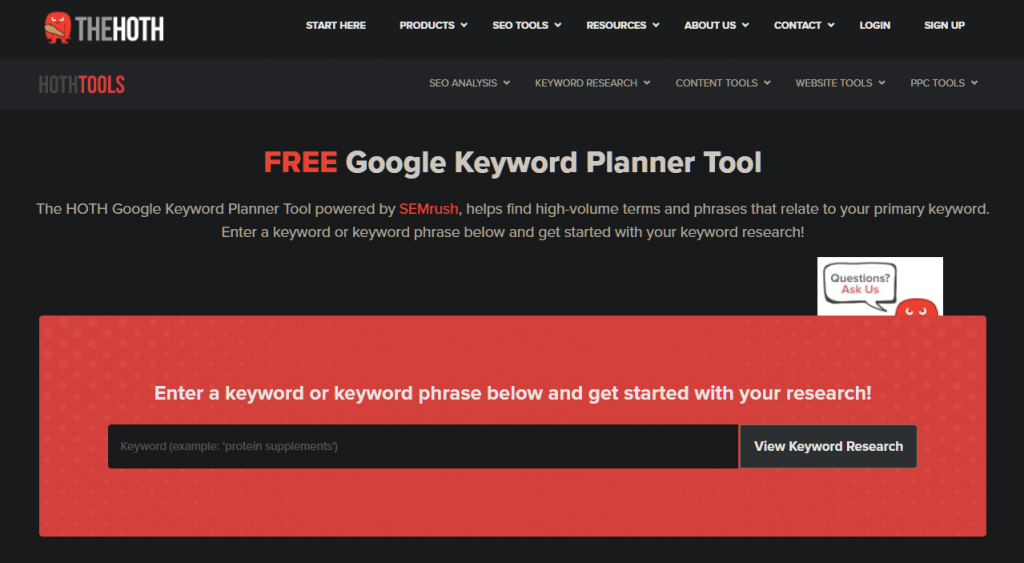Quick Links
How many backlinks do I need for my website?
This is the #1 question we get from new clients at The HOTH.
The only problem is it’s essentially an impossible question, as there’s no magic number of backlinks that every site needs.
In fact, asking this question is on par with other impossible questions like, “How many licks does it take to get to the center of a Tootsie Pop?” and, “How much wood could a woodchuck chuck if a woodchuck could chuck wood?”
When most SEOs get this question, they all say the same thing:
“It depends.”
We think that’s pretty lame, and we’re sick of hearing it.
That’s why we’re going to do the impossible and attempt to answer this borderline rhetorical question.
Along the way, you’ll learn more about the current state of backlinks as a ranking factor, as well as some up-to-date techniques for generating high-quality links that point to your homepage and content.
Do Links Still Matter? Addressing Google’s Recent Comments
In September 2023, Gary Illyes, an Analyst on Google’s Search Team, claimed during an AMA that ‘links were no longer a top 3 ranking factor, and haven’t been for some time.’
This caused some to think that backlinks no longer mattered at all, which isn’t true.
Here’s his quote: “I think they are important, but I think people overestimate the importance of links. I don’t agree it’s in the top three. It hasn’t been for some time.”
Illyes didn’t say that backlinks had no ranking power, as he still said they’re important.
Beyond that, there’s good reason to take Illyes’ words with a grain of salt.
Why is that?
It’s because Google is always a bit cagey when disclosing information about their search algorithms. It’s not that they outright lie per se, just that they have a habit of bending the truth and omitting key pieces of information.
It’s the same reason why they don’t make their PageRank algorithm public, as they feel too many businesses would game the system for better SERP rankings.
Google’s ultimate goal is to provide the best search experience for its users, which means matching their queries with the highest quality results that come from trusted, authoritative sources.
Therefore, Google has a bit of a love/hate relationship with SEO.
They know that it’s necessary for businesses to improve their visibility on their engine, but their SEO advice seldom goes beyond ‘make better content.’
Proof backlinks are still the real deal
Take it from us: backlinks still matter in a very big way.
Perfect technical SEO and flawless on-page factors will only get you so far.
Whenever we have a client that can’t outrank its competitors, links are almost always the reason why.
Since the websites occupying the top-ranking spots have more high-quality links than our clients’ sites, outranking them with basic SEO tactics is next to impossible.
As a result, we spend the most time ‘closing the competitive gap’ by building enough links for our clients to level the playing field with their top competitors.
The fact remains that more links equal better SERP rankings AND more organic traffic, which is why high-value links are so powerful (they’re literally working double duty for you).
To put our money where our mouth is, here’s hard evidence from one of our clients that backlinks and traffic go hand-in-hand:
As you can see by the line graphs, as the client’s backlinks started to increase, their organic traffic followed suit.
The lesson?
You should always believe the hard data you collect from your own experiments and campaigns over comments from Google’s team regarding SEO.
Other Crucial Ranking Factors
While links are still extremely important for Google SEO, they’re by no means the only ranking factor.
As we said before, building more links is what bridges the competitive gap for our clients most of the time. However, if their technical and on-page factors aren’t also in perfect order, it won’t be possible to reach the top of the SERPs.
To summarize, for backlinks to show their true power, other crucial ranking factors like site speed need to be up to par; otherwise, you may not even rank.
Let’s be clear: the #1 most important ranking factor is the quality and relevance of your content.
If you aren’t producing high-quality content that satisfies user’s search intent, your hopes of becoming the SEO GOAT will never come to fruition.
Moreover, the quality and relevance of your content are also extremely important to your target audience, and you should always produce content for them first and search engines second.
Here’s a look at the top SERP ranking factors besides backlinks and content:
- SSL certificate (HTTPS for a secure web browsing experience)
- Adequate site speed to pass Google’s Core Web Vitals test
- Content length (Google views pages with less than approximately 1,000 words as thin content)
- Keyword usage (first 100 words, title tag, headers)
- URL and site architecture (logical, flat design with lots of internal links)
- Content must load properly on mobile devices (Google uses mobile-first indexing)
- External links (content should link out to reputable sources)
- Content quality via E-E-A-T (experience, expertise, authoritativeness, trustworthiness)
These factors are all imperative for SEO success, so you shouldn’t neglect any of them during your search campaign.
The Classic Debate: Quantity vs. Quality
SEOs are always fiercely debating whether backlink quality or quantity matters most.
Some swear that only the most reputable, highest-quality backlinks are worth pursuing, while others claim to find success by building as many links as possible.
Which side of the issue is true?
We hate to be boring, but the truth of the matter is both quantity and quality are of equal importance to your link profile.
Let’s clarify that a bit further.
In terms of quantity, it’s NEVER worth pursuing low-grade backlinks from garbage websites that provide no value to users.
These links scream spam to Google, and they’ll only hurt your SERP rankings.
However, when you’re trying to bridge a significant link gap between you and a competitor (where you have dozens of links and they have hundreds or thousands), sometimes links with average domain authority (scores 40 to 50) are exactly what you need.
These average links are still from real websites that provide services to users, so there’s no worry about them getting flagged as spam.
Moreover, they’ll provide you with the volume of links you need to catch up to the competition.
In other words, beggars can’t be choosers when you’re far behind in the backlink race.
That’s not to say that you shouldn’t shoot for the stars and target high-value backlinks (DA scores 60 and above) at the same time, as you definitely should.
Conversely, if you’re practically on par with the number of links a competitor has, then going for high-quality links is the name of the game.
Ultimately, it depends on what you’re trying to achieve. If you’re far behind, quantity can beat quality – but if you’re neck-and-neck, quality reigns supreme.
How Many Backlinks Do New Websites Need?
If you’ve got a brand-spanking-new website, you’re starting from square one in terms of backlinks.
The same is also true for all SEO ranking factors.
Before you start pursuing backlinks full-time, you should get your technical SEO and on-page SEO in order.
That means doing things like planning out your URL structure and site architecture, doing keyword research to inform your content strategy, and ensuring your site is mobile-friendly and has an SSL certificate (it’s remarkably easy to get an SSL certificate for free).
Also, you need to start populating your new site with lots of stellar content based on queries that your target audience searches for the most (you can use our free keyword planner tool for this).
Don’t forget to include content for each stage of your sales funnel based on the intent behind the keywords you find.
Once that’s all set, you can start building links for your site, but how many do you need?
On average, you should shoot for 50 links pointing to your homepage and around 100 for each web page that you want to rank.
Drop anchor! Achieving the proper anchor text ratio
Besides the links themselves, the anchor text you choose for each link is also incredibly important.
Anchor text refers to the words that you use to display a hyperlink, and there are a few ways you can go about it:
- Exact match anchors consist entirely of the target keyword for the page in question. You should use these anchors sparingly, as Google views too many as spam.
- Partial match anchors contain your target keyword as well as a few other phrases to add context. It’s a safer bet to use partial match keyword anchors instead of an exact match.
- Branded anchors use your brand name as a link.
- Natural anchors don’t use any keywords or brand names, just natural words in the sentence containing the link.
- Naked URLs don’t use any anchor text in favor of using a bare URL.
For your backlink profile to achieve its maximum impact, it needs to feature a favorable anchor text ratio.
For the most part, you should use exact match anchors sparingly while opting for partial match, branded, and natural anchors most of the time.
How Do You Get Backlinks?
By now, you should have a specific number of backlinks you need to build.
To reiterate what we’ve covered so far:
- Analyze your competitor’s links to see how large of a gap there is between their link profile and yours. If it’s large, going for quantity over quality can work until you start to catch up. If it’s small, your goal should be to obtain as many high-value links as possible.
- If you’re working with a brand-new website, aim for 50 links to your homepage, with around 100 links for your most important web pages.
Now that we’ve answered the titular question of this article, another one remains.
How do you build links that point back to your content?
Here’s a look at some of the most effective ways to acquire backlinks.
Reach out and touch someone: targeted link outreach
Conducting outreach is necessary for just about any backlink technique, and it’s become more nuanced in recent years.
In the past, SEOs found success using generic outreach templates that contained simple requests for guest articles, link insertions, and fixing broken links.
The only problem is this technique worked a little too well.
Once it caught on, it became the norm (and still is) for website owners to receive hundreds of generic outreach emails every day.
Currently, the link outreach game is about standing out from the crowd while developing long-lasting relationships that lead to multiple links down the line.
It’s crucial to shift your mindset from targeting one link at a time to forging long-term link partnerships with related websites in your field.
Also, divorce the link outreach process from one particular tactic, such as guest posting.
When done properly, your outreach can lead to a lot more than guest blogs (although those are pretty sweet, too).
As an example scenario, let’s say that your website sells fitness products.
In that case, you’d benefit from forming link partnerships with noncompetitors in your field – meaning you share a target audience but don’t compete for the same business.
Examples include fitness news websites, fitness forums, and nutrition blogs – just to name a few.
Instead of sending one-and-done outreach emails, you start interacting with these sites in a far more personal way. Your goal is to form a relationship instead of securing one measly link placement, so you should interact with their social media, ask interesting questions, and share their content.
If you play your cards right, you’ll form a partnership that leads to guest posts, link insertions, and article syndications.
Press releases and article syndication
Speaking of syndication, you can start publishing your articles on other websites to gain more exposure and accrue links.
Relationship building is a key component here, too, as you’ll need an existing network of relevant websites to publish your articles.
If you don’t have any connections yet, try searching on Google for things like:
- “Originally published on” (niche keyword)
- “Syndicated from” (niche keyword)
- “Originally appeared on” (niche keyword)
These search operators will help you find websites in your field that syndicate posts and it’s worth trying to build relationships with them.
You can also use our free backlink checker tool to analyze your competitor’s links to see if they’re syndicated anywhere that you aren’t.
Press releases (as long as they don’t mention time-sensitive events) are another great way to get the word out about your brand and obtain links.
This is where it pays off to have relationships with news outlets in your niche, as you’ll be able to circulate your press releases to them for some easy links.
To further your education, here are some more reliable ways to build backlinks from relevant websites.
Start Building the Right Number of Links Today
Well, wasn’t that a much better answer than simply saying, “It depends?”
Now, you have an accurate approximation of how many links you need to build to achieve your ranking goals, and you know the best ways to build them.
This is only the first step in your journey to becoming the SERP GOAT, so stay tuned to our blog for more practical advice.
If you need help building the right number of links for your website, don’t wait to check out our Link Outreach and Link Insertion services.












Great Article Guys! Just Ordered some guest posts.
So Google is making it hard every day, so to rank a keyword which has difficulty 29, we need 32 backlinks but this tool doesn’t tell us that what should be quality of these backlinks, may be only backlink from a guest post can be enough as compared to 32 links.
Get 32 in-content backlinks, wait a few weeks and you’ll see if they were good enough 🙂
This came at the right time… Thanks a bunch
Are there any free tools that you know of for figuring out this same information?
You can check semrush free plan
Obtaining backlinks nowadays is a great task as requires a lot of effort and time. Also, once you obtain a backlink it takes time for your site’s ranking to improve in search results. Thanks, Hoth team for writing such a useful article 🙂
I like the tool that tells you about how many backlink it takes for the site to rank on top 10. Short and informative article you have there.
I think guest post back link still does help a lot for better ranking on search engine. Ok, now one point to be noted here, back link from quality guest can help, not the junk one. I am using this technique to grow my site.
Great post! It is always interesting I think to check in Ahrefs like you mention to see the sheer difference in terms of how many backlinks and unique RD different websites have on any given SERP.
Great post! Building backlinks are that one thing most of dread to do. It just seems tougher to do when you’re a small business without the brand recognition the bigger guys get. Info like this definitely helps!
Thanks for the post. I want to start buying some myself.
If you have any questions about it simply submit a ticket with our support department.
What impact does the SERP layout have on the overall value of a page one ranking in the first place?
I’ve seen data from G that this current layout only has about 20% of all clicks on the page occurring in organic listings. Meaning that 80% of search traffic has found a solution to their query before getting that far down the page.
How does that factor into what decisions you make on traffic?
Every query is different and it’s going to be hard to make a blanket statement, but Ahrefs does use clickstream data to factor that in, so I like to look at their traffic estimates.
Re: The layout, I’m a big fan of getting out of the tools and really searching the keywords in Google to see what’s coming up. The results will often surprise you (local map packs ranking, youtube videos, rich snippets, different search intent types of articles). Then mimic that content to gobble up as much traffic.
Either way, ranking high is going to be better than ranking low (or not trying at all), and there is so much opportunity with SEO.
As a side note, ads are growing bigger and look more and more like organic search results. We can help with that too!
1 good link may be worth more than 10,000 crappy links but no one knows which is that 1 good link.
In-content links on high authority domains are what you’re looking for.
Great post! Guest posts are the best backlinks, but your price is a little expensive, I will consider your service.
Thanks for the comment!
Good Info! Obtaining solid high-quality links from relevant industry sites takes a lot of time, energy and effort. There is no short cut to improving your search results.
Ahrefs Keyword Explorer is a paid tool…what other tools will provide the same or similar results?
short and to the point. Thanks HOTHers!
I’m going to be buying some incontent links soon. Just saving up for it. Thanks for the info. Very handy. I don’t have Ahref, would love it if you can help in getting some data.
Just book a meeting with us here and we can run reports for you!
Do you really have to do guest posts? Is there another way?
Yes, there are lots of ways to get links! With that said, in-content links on good sites are really what you want to drive rankings and guest posts are one of the most scalable and effective ways of getting them.
I’m having a hard time right now getting on first page of Google, and this article is really helpful.
Though one thing you missed which I would like to add is **PATIENCE & Consistency**
It’s been a month I launched website and still 0 visitors a day lol.
One website I launched last year was in low competitive niche, so I got 50 visitors a day after around 2 months, and ranked for some good keywords on the first page.
Yes 100% – We wrote an article about this here: https://www.thehoth.com/blog/why-you-need-the-gym-of-seo/
Ahref show 30 link need…is it 30 link every month we need to build to rank in 1st page?
It would be 30 total, but keep in mind top rankings generally continue to receive links over time, so this number may change as well in the future.
Thanks, I appreciate your efforts to show us how many back links to be first on google..
This is great insight of how many links needed, my travel blog’s DA is stuck at 25 for long , the target traffic is from India, I have few good backlinks to my domain, what should I do more?
Your Domain Authority will increase by getting more links.
When I’m looking at the backlinks to build in other to win, I try to look at the page level and the velocity of the link the top 5 received because I want the link to look natural, I don’t want to be too pushy.
And for the number of link you need to rank, there’s no actual figure but for Google to consider you as a contender in the top ten, you need to get around the same number of links they have.
Plug your keyword into any link explorer and find the number of root domains that links to the page, remember the link should be on a page level.
Do this for all top 10 result to find the number of root domains and calculate the average number of root domains. That gives you the number of root domains you need.
how to get backlink from 0 backlink in a site
Thanks for this useful information.How to get free Df Backlinks. Request to guide . I am new in this . How get traffic on a particular keyword in which difficult to get traffic.
haha right when I first clicked on the link to this article, I answered the question to myself “It depends”… then immediately saw that at the top of the page while it loaded.
But from my experience, domain authority is a really huge factor that gets overlooked very often when it comes to ranking. Because of that, I’ve stayed away from a lot of the ambitious keywords I’ve wanted to rank until I build much more authority myself.
Thank you very much Clayton for this complete guide about how to create the first 100 backlinks. I totally agree with you, quality backlinks are the gold key for ranking high, unfortunately it is not so easy to get them so my motto is: “whatever link (not spammy) is just better than no link”.
nice article I have one doubt which basis google will search results top position websites for one keyword. which one high priority in search result appears to tell me.
thanks for this great post. All post of Thehoth is awesome. Learn good things from this article.
Great aticle. I think getting backlink from a higher authority domain makes content much more trustworthy than multiple backlinks from less or no authority domains.
Great Read.
Thank you very much Clayton. The first 100 backlinks are probably the hardest given that in time you would drop some along the way. But reaching 100 quality links.. The quality of the backlink would be more important than quantity in today’s SEO world wouldn’t you say?
Thankyou for this post very interested as im constantly trying to build my backlinks quality is the key. The Hoth has really helped me over the last few months with my SEO.
Appreciate all the efforts that you have taken to do such a detailed post! Thanks for sharing.
Hi Clayton Johnson, I’m not the first to tell you this, but you really helped a lot of people putting all this information down. Thanks so much!
Nıce
How can I get excellent backlinks for my website:
https://renaissance-translations.com/english-hindi-translation-services-in-the-uk/
How can I get excellent backlinks for my website?!
Hit up our team, they’ll be happy to help: https://www.thehoth.com/meet/
Good Information!
It takes a lot of time, effort, and energy to acquire reliable, high-quality links from sites that are relevant to the business.
Good job and thanks for sharing
This is awesome and i appreciate the post. Really educative and i really wish to know how to get backlinks. Can you help?
Hey Rachel, I completely agree with you. One good backlinks worth 10000 cheap link. Also, content plays a major role in ranking and i try to create long form and guest post in niche sites to acquire high quality link that works for me.
I read this article very carefully and backlinks are one of the most important ranking factors no doubt …. but what about the age of the website? Do you think it is still important?
Hey Michael,
Not a hard and fast rule, but I’d say the longer a website has been around, the more authority it’ll have just via simple ranking factors. That said, things like DA and DR, traffic and general reach will have a more profound impact on the link’s value. Hope this helps.
Thank you Rachel
Thanks for the post. I want to discuss about some for our website before buying.
You can schedule a call with one of our experts here to dive a bit deeper: http://www.thehoth.com/meet
I’m going to be buying some incontent links soon. Just saving up for it. Thanks for the info. Very handy. I don’t have Ahref, would love it if you can help in getting some data
Hey, the content is awesome, and it’s very informative. Keep up the good work
Is this still applicable in all niches and can I do it for my photobooth rental company?
For me, finding the best numbers is by analyzing the Google Search Results and making a roadmap accordingly. I’ll clear this up with an example.
Suppose I search for “SEO Services Phoenix.”. I find different websites ranking in the Top 10 Spots of Google. I’ll use Ahrefs’ Free Backlink Checker to count the referring domains of the websites. The average number of referring domains these websites are getting is around 350-430. It means I need to make backlinks on at least 500-520 websites to outrank these websites and earn the top 10 positions. That’s how I calculate the number of links I need to make to rank a particular keyword, but here is one more thing.
I can’t make 500 links in one month on a new website. This thing confuses the newbies. You can’t make 500 links in one month, but you need to wait for some months to pass. I commonly start building backlinks after 40-50 days when my content gets uploaded. I prefer building 5-6 links in the 1st month, 7-9 links in the 2nd month, and 10-12 links in the 3rd month. That’s how my speed continues. After 7 months, I start building 15 links monthly. I’ll reach the 500 referring domains in at least 1.5 or 2 years.
That’s my ranking strategy, but you’ve also shared some deep insights with the audience. Overall, your post on discovering the number of backlinks is good. Please keep up the hard work, Rachel Hernandez. I have 8 years of experience in SEO. I liked your article, which was the reason to share some of my knowledge with your audience. Thanks!